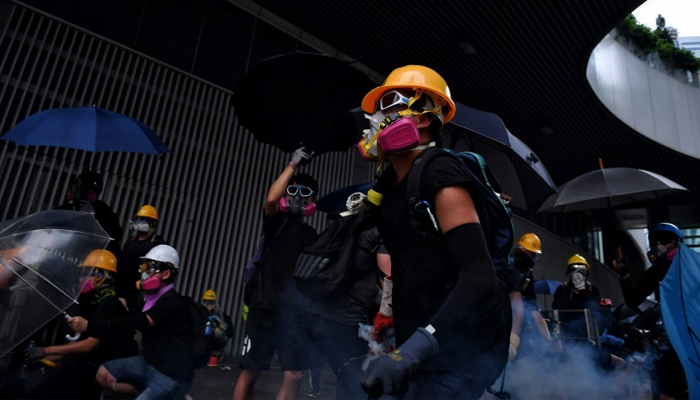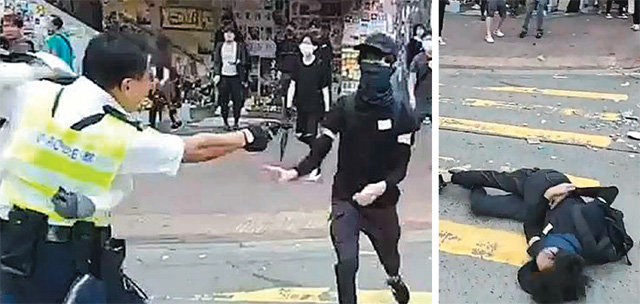Trump expected to sign Hong Kong bill after it clears House, Senate
By Danielle Wallace
President Trump is expected to sign a bill aimed at protecting human rights in Hong Kong amid an escalating pro-democracy movement in the semiautonomous city after the legislation cleared both chambers of Congress this week, with overwhelming support on both sides of the aisle.
The Hong Kong Human Rights and Democracy Act passed in the House Wednesday by a 417-1 vote.
The Hong Kong Human Rights and Democracy Act passed in the House Wednesday by a 417-1 vote.
The proposed legislation was unanimously approved in the Senate on Tuesday.
The bill gained support in recent days as police tightened their siege of the Hong Kong Polytechnic University, where hundreds of young protesters remained holed up trying to evade arrest.
“Today, the Congress is sending an unmistakable message to the world that the United States stands in solidarity with freedom-loving people of Hong Kong, and we fully support their fight for freedom,” House Speaker Nancy Pelosi said during the bill’s consideration, according to Politico.
Florida’s GOP Sen. Marco Rubio, who first introduced the Senate’s version of the bill in June, asked President Trump on Wednesday to sign the proposed legislation after the House vote.
“The U.S. House has just passed our #HongKongHumanRightsandDemocracyAct. It’s now headed just an @Potus signature away from becoming law. A powerful moment in which a united, bipartisan coalition made it clear that we #StandWithHongKong,” Rubio said on Twitter.

Marco Rubio
✔@marcorubio
The U.S. House has just passed our #HongKongHumanRightsandDemocracyAct.
It’s now headed just an @Potus signature away from becoming law. A powerful moment in which a united, bipartisan coalition made it clear that we #StandWithHongKong13.8K
11:18 PM - Nov 20, 2019
The Hong Kong Human Rights and Democracy Act would require the secretary of state to certify at least once a year that Hong Kong retains enough autonomy in order to retain special trade status under U.S. law, something which allows the city to thrive as a world financial hub.
“Today, the Congress is sending an unmistakable message to the world that the United States stands in solidarity with freedom-loving people of Hong Kong, and we fully support their fight for freedom,” House Speaker Nancy Pelosi said during the bill’s consideration, according to Politico.
Florida’s GOP Sen. Marco Rubio, who first introduced the Senate’s version of the bill in June, asked President Trump on Wednesday to sign the proposed legislation after the House vote.
“The U.S. House has just passed our #HongKongHumanRightsandDemocracyAct. It’s now headed just an @Potus signature away from becoming law. A powerful moment in which a united, bipartisan coalition made it clear that we #StandWithHongKong,” Rubio said on Twitter.

Marco Rubio
✔@marcorubio
The U.S. House has just passed our #HongKongHumanRightsandDemocracyAct.
It’s now headed just an @Potus signature away from becoming law. A powerful moment in which a united, bipartisan coalition made it clear that we #StandWithHongKong13.8K
11:18 PM - Nov 20, 2019
The Hong Kong Human Rights and Democracy Act would require the secretary of state to certify at least once a year that Hong Kong retains enough autonomy in order to retain special trade status under U.S. law, something which allows the city to thrive as a world financial hub.
Under the proposed legislation, President Trump would be responsible for imposing sanctions on Hong Kong and Chinese officials who commit human rights violations against protesters in the city.
The White House has not commented on the bill.
The White House has not commented on the bill.
Its passage comes as Trump tries to negotiate a trade deal with China amid his bid for reelection in 2020.
Trump told reporters on Wednesday he would be content continuing to accept the tariffs on $350 billion worth of Chinese goods if a deal couldn’t be reached, according to Politico.
“We continue to talk to China. China wants to make a deal. The question is: Do I want to make a deal? Because I like what’s happening right now. We’re taking in billions and billions of dollars,” Trump said.
“We continue to talk to China. China wants to make a deal. The question is: Do I want to make a deal? Because I like what’s happening right now. We’re taking in billions and billions of dollars,” Trump said.
Chinese Foreign Ministry spokesperson Geng Shuang slammed the U.S. for challenging its sovereignty over Hong Kong after the bill first cleared the Senate on Tuesday.
The legislation passed in the House despite China’s warning.
China assumed control of the former British colony in 1997 but promised to let Hong Kong retain a high-level of autonomy.
“Today, it is beyond question that China has utterly broken that promise,” Pelosi said.
“America has been watching for years as the people of Hong Kong have been increasingly denied their full autonomy and faced with a cruel crackdown on their freedoms and an escalation of violence.”
She added that recent escalations in violence in Hong Kong – which saw protesters use gasoline bombs and bows and arrows to fend off police backed by armored cars and water cannons -- “have shocked the world as unconscionable and unacceptable.”
The House and Senate this week both unanimously passed a second bill that aims to ban American companies from exporting crowd control munitions to Hong Kong police, Politico reported
She added that recent escalations in violence in Hong Kong – which saw protesters use gasoline bombs and bows and arrows to fend off police backed by armored cars and water cannons -- “have shocked the world as unconscionable and unacceptable.”
The House and Senate this week both unanimously passed a second bill that aims to ban American companies from exporting crowd control munitions to Hong Kong police, Politico reported


.jpg?itok=NaNAdojG)

